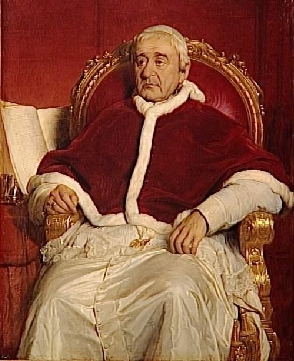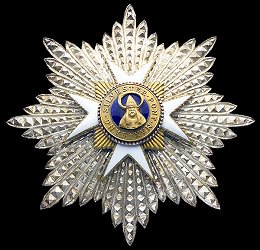Pope Gregory XVI 1765 – 1846
July 21, 2009
 Pope Gregory
XVI 1765 – 1846, born
Bartolomeo Alberto Cappellari, named Mauro as a member of the
religious order of the Camaldolese, was Pope of the Roman Catholic
Church from 1831 to 1846.
Pope Gregory
XVI 1765 – 1846, born
Bartolomeo Alberto Cappellari, named Mauro as a member of the
religious order of the Camaldolese, was Pope of the Roman Catholic
Church from 1831 to 1846.
Pope Gregory XVI was favourably impressed by the ability of homeopathy
to combat the cholera epidemics sweeping Europe at this
time,
and he awarded
the
 Grand
Cross to Settimio
Centamori for
his work in combating these terrible
epidemics,
Grand
Cross to Settimio
Centamori for
his work in combating these terrible
epidemics,
Pope Gregory XVI issued the official permission that allowed Johann Wilhelm Wahle to practice homeopathy in the Vatican, where he became the homeopathic physician to the Vatican Jesuit Convent.
In 1845, Pope Gregory XVI
awarded
Comte Sebastien Gaeten Salvador Maxime Des
Guidi
the  Order of Saint
Sylvester. Pope
Gregory XVI
awarded
Charles
Ozanam
the
Order of Saint
Sylvester. Pope
Gregory XVI
awarded
Charles
Ozanam
the  Order of Saint
Gregory the
Great, and
he also awared homeopathy the priviledge of a Papal Bull, allowing the
administration of homeopathic remedies by Priests in emergencies, in the
absence of a
doctor.
Order of Saint
Gregory the
Great, and
he also awared homeopathy the priviledge of a Papal Bull, allowing the
administration of homeopathic remedies by Priests in emergencies, in the
absence of a
doctor.
Pope Gregory XVI sought to open a homeopathic hospital at this time, but opposition from the allopathic physicians, and the decline of cholera all coincided to prevent this happening.
Nathan Rothschild’s financing of Britain resulted in the defeat of Rome’s enemy Napoleon Bonaparte, (as well as being the source of his wealth and influence). Since Gregory XVI conferred a Papal decoration on Kalman Rothschild for loaning the Vatican five million pounds in a period of difficulty, the Rothschilds have been the fiscal agents of the Vatican.
In the course of the struggle which ensued, it was more than once necessary to call in Austrian defenders against red shirted republicans engaged in a terrorist campaign. The conservatives postponed their promised reforms after bombings and assassination attempts. Nor did the replacement of Bernetti by Luigi Cardinal Lambruschini in 1836 mend matters.
Pope Gregory and Luigi Cardinal Lambruschini opposed basic technological innovations such as gas lighting and railways, believing that they would promote commerce and increase the power of the bourgeoisie, leading to demands for liberal reforms which would undermine the monarchical power of the Pope over central Italy.
Gregory in fact banned railways in the Papal States, calling them chemins d’enfer (literally “ways of hell,” a play on the French for railroad, chemin de fer, literally “iron road”). However, under pressure from the French, Gregory was liberal in forgiving imprisoned revolutionaries, a policy which might have aided the final overthrow of Gregory’s successor, Pope Pius IX, as temporal ruler in 1870.
The financial condition in which Gregory XVI left the States of the Church makes it questionable how far his expenditures for defensive, architectural and engineering works, and his magnificent patronage of learning in the hands of Angelo Mai, Giuseppe Caspar Mezzofanti, Gaetano Moroni and others, were for the real benefit of his subjects.
The insurrections at Viterbo in 1836, in various parts of the Legations in 1840, at Ravenna in 1843 and Rimini in 1845, were followed by wholesale executions and severe sentences, hard labour or exile; still the Papal States seethed with unrest.
However, on 3 December 1839 Gregory also issued the encyclical _In Supremo Apostolatus, _stating:
…the slave trade, although it has diminished in more than one district, is still practiced by numerous Christians.
This is why, desiring to remove such a shame from all the Christian nations, having fully reflected over the whole question and having taken the advice of many of Our Venerable Brothers the Cardinals of the Holy Roman Church, and walking in the footsteps of Our Predecessors, We warn and adjure earnestly in the Lord faithful Christians of every condition that no one in the future dare to vex anyone, despoil him of his possessions, reduce to servitude, or lend aid and favour to those who give themselves up to these practices, or exercise that inhuman traffic by which the Blacks, as if they were not men but rather animals, having been brought into servitude, in no matter what way, are, without any distinction, in contempt of the rights of justice and humanity, bought, sold, and devoted sometimes to the hardest labour…
We reprove, then, by virtue of Our Apostolic Authority, all the practices above mentioned as absolutely unworthy of the Christian name. By the same Authority We prohibit and strictly forbid any Ecclesiastic or lay person from presuming to defend as permissible this traffic in Blacks under no matter what pretext or excuse, or from publishing or teaching in any manner whatsoever, in public or privately, opinions contrary to what We have set forth in this Apostolic Letter.